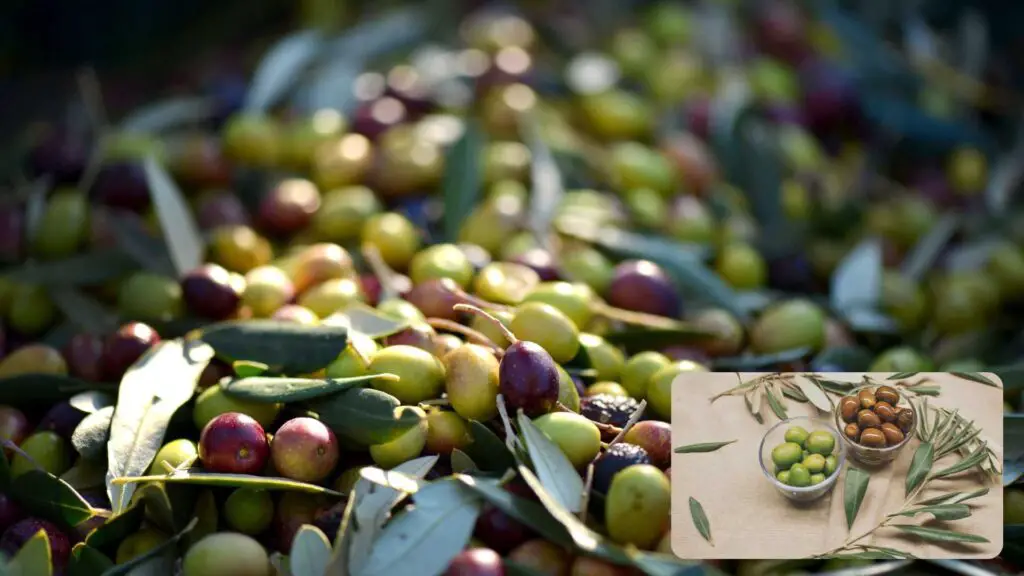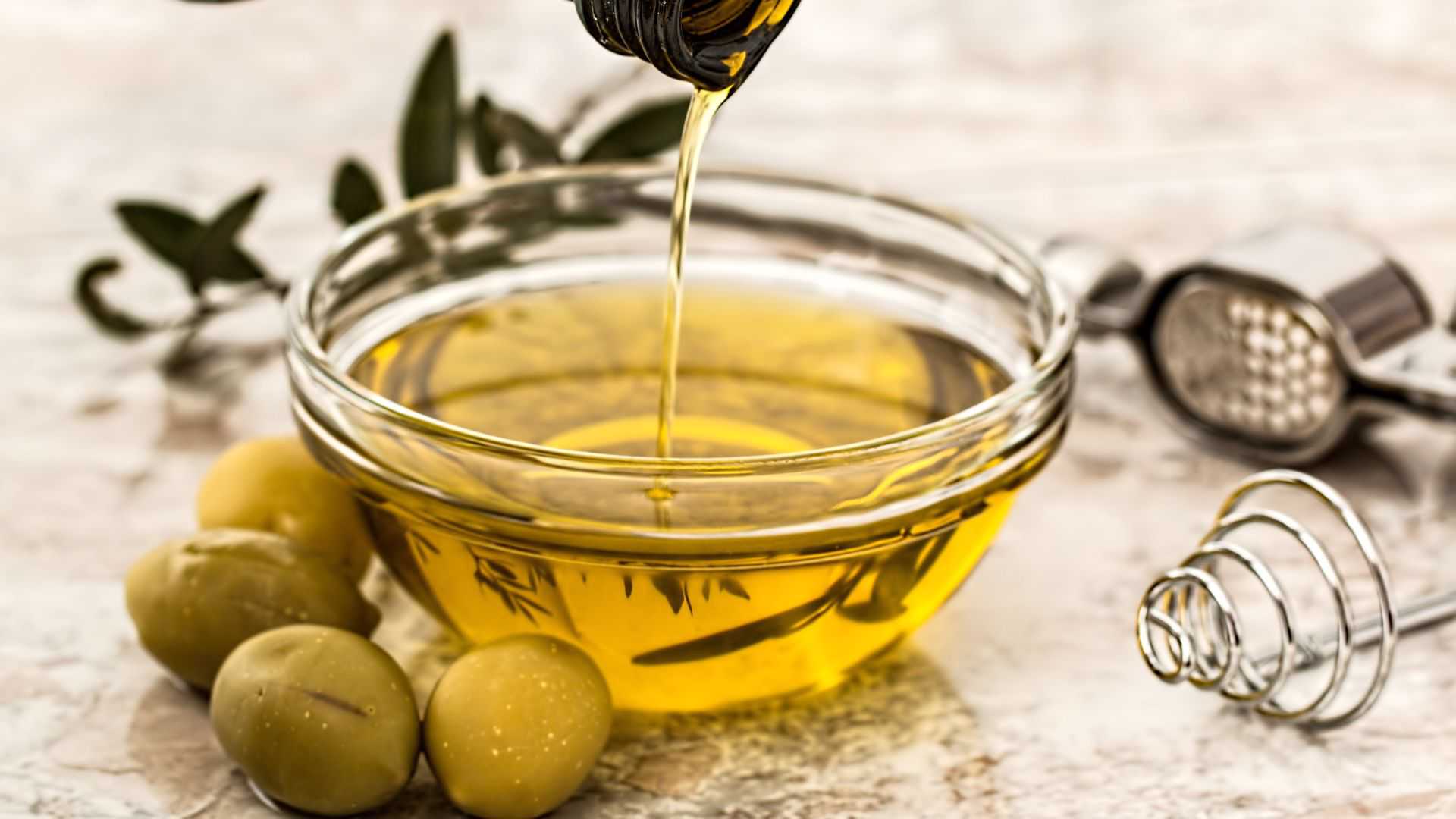Olives are the world’s gift from heaven (Jannah). In addition to the date fruit, Muslims also place a high value on olives. Both the Quran and hadiths make several mentions of the olive and its tree. In addition to being a good source of nutrition and being regarded as a “blessed” fruit by Muslims, olives are also utilized in “ruqyah treatments” and as a health food. Let us learn some Health Benefits of Olive Oil in Islam.
“By the fig and the olive and [by] Mount Sinai, And [by] this city of security [Makkah]. Verily, We have certainly created man in the best of stature.” (Surah Tin:1-4).
Mention of Olives in the Quran

Seven times in the Qur’an are olives referenced. This demonstrates the value it possesses. One of the mentions appeared in the ayat below:
“And He it is who causes gardens to grow, [both] trellised and untrellised, and palm trees and crops of different [kinds of] food and olives and pomegranates, similar and dissimilar. Eat of [each of] its fruit when it yields and give its due [zakah] on the day of its harvest. And be not excessive. Indeed, He does not like those who commit excess.” [Surah Anaam:141]
Another verse emphasizes the olive oil’s luminescence property, which is vividly described in the Noble Qur’an:
“Allah is the Light of the heavens and the earth. The example of His light is like a niche within which is a lamp, the lamp is within glass, the glass as if it were a pearly [white] star lit from [the oil of] a blessed olive tree, neither of the east nor of the west, whose oil would almost glow even if untouched by fire. Light upon light. Allah guides to His light whom He wills. And Allah presents examples for the people, and Allah is Knowing of all things.” (Surah Nur: 35).
One of the gifts of the plant kingdom, the olive tree has a religious purpose as an indication (ayah) of Allah in addition to being beneficial for health and beauty (SWT).
“He causes to grow for you thereby the crops, olives, palm trees, grapevines, and from all the fruits. Indeed, in that is a sign for people who give thought. “(Surah Nahl:11).
Olives in the Hadith
The Hadith places a lot of emphasis on olives and their oil. According to the Prophet Muhammad (SAW):
“Eat olive oil and use it on your hair and skin, for it comes from a blessed tree.” (al-Tirmidhi, 1775)
In prophetic medicine, the health advantages of olives have been suggested. It is claimed that the Hazrat Muhammad (PBUH) remarked:
“Take oil of olive and massage with it – it is a blessed tree.” (Darimi, 69:103).
What Science says about Olives
Like the dates, the olive is highly prized in both ancient and contemporary cultures. For several thousand years, it has been used as anything from money to medicines throughout the Mediterranean civilization (Zwingle, 1999).
The advantages of the Mediterranean diet, which is high in olive oil, have been lauded since the 1950s. It has long been touted as having positive effects on lowering cholesterol levels (Assmanm and Wahrburg), but there is growing evidence that it also lowers blood pressure.
The applications of olive products in medicine and cosmetics are simply amazing. Dieticians advise using the oil because of its high nutritional value and potential to lower cholesterol as well as “enhance the balance of fats within the blood” (Adams, 2001).
Health Benefits of Olive Oil in Islam
Heart Condition
Modern scientists have conducted a great deal of research in recent years on the therapeutic and nutritional benefits of olive oil. Studies have demonstrated the oil’s significant value in both situations, advising its daily dietary intake.
According to studies, olive oil’s fatty acids and antioxidants can provide a number of significant health advantages, including a lower risk of heart disease. The component of olive oil that offers the highest protection against heart attack and stroke was identified by Portuguese researchers in a 2009 study that was published in Molecular Nutrition & Food Research.
Some of the healthiest populations in the world have made olive oil a mainstay of their diets. For instance, traditional Mediterranean communities had reduced rates of cardiovascular disease, including heart issues, heart attacks, and strokes.
In general, the Mediterranean diet is low in red meat and moderate in dairy, fish, and poultry while being high in fruits, vegetables, whole grains, nuts, and olive oil. People in the Mediterranean basin have historically had the healthiest lifestyles in the world because to their food, which is enriched by the strength and energy of olive oil.
Numerous other studies have demonstrated a decreased risk of heart disease in people who consume large amounts of olive oil. Extra-Virgin olive oil in the diet has been shown to be a main preventive measure for cardiovascular illnesses.
Brings down inflammation
More research indicates that consuming olive oil may have a number of health advantages. Inflammation, the main cause of chronic diseases like cancer, is reduced by olive oil.
Certain elements in olive oil aid to lessen bodily inflammation. Numerous studies have emphasised the advantageous anti-inflammatory properties of the phenolic component in particular. Oleocanthal, a phenolic found in virgin olive oil, has developed a reputation as a substance of interest in the search for therapeutic targets against a variety of chronic inflammatory diseases, including cancer, neurological illness, and joint degenerative disease.
Encourages bone health
According to a study conducted in 2014 on 523 women, those who consumed more than 18 grammes (20 ml) of olive oil daily had considerably stronger bone density than those who consumed less. The study emphasised a beneficial relationship between olive oil and bone health.
How to Use Olive Oil in Islam
Some inhabitants of the Mediterranean area, according to reports, consume up to or approximately 1/4 cup (60 ml) of olive oil each morning. Although this might be the greatest approach to get its advantages, there isn’t enough research to show that drinking olive oil is healthier.
In Islam, excess of anything is generally not recommended; moderation is the goal. Keep in mind that olive oil is one of those things where a little really does go a long way. A teaspoon of extra virgin olive oil, taken two or three times a day, will do wonders.
“When the oil is blended with water, it becomes less hot, milder and thus more beneficial,” Ibn Qayyim wrote in his book.
Some people put a little olive oil on top of their food or salad, while others add a teaspoonful to a glass of water with a slice of lemon and drink it first thing in the morning.
These were some of the Health Benefits of Olive Oil in Islam and why olive oil is given importance in Islam. Read more Islamic Blogs or follow us on social media for Islamic reminders.






